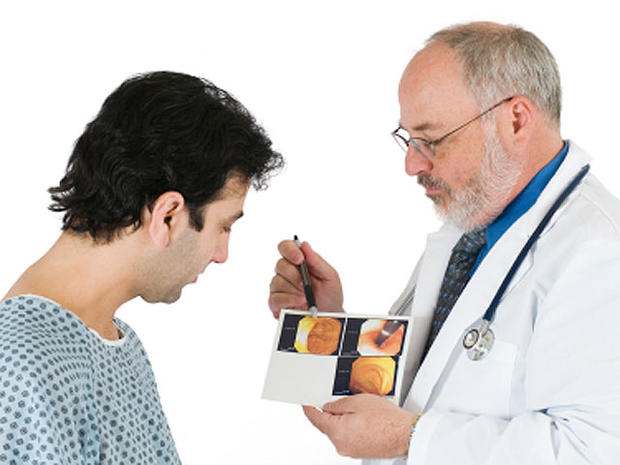Colon cancer screening should start at 50, says American College of Physicians
(CBS News) A new guidance statement from the American College of Physicians states what a lot of American adults may already know: They should get screened for colon cancer once they get older to reduce their risk of dying from the nation's number two cancer killer.
PICTURES - 10 myths about colon cancer
"Only about 60 percent of American adults aged 50 and older get screened, even though the effectiveness of colorectal cancer screening in reducing deaths is supported by the available evidence," Dr. Virginia L. Hood, president of American College of Physicians, said in a written statement.
The College's new guidance statement includes recommendations from guidelines developed by other medical societies. According to the ACP, most adults should get screened for colon cancer beginning at age 50. People with a family history of colon cancer and others considered high-risk should get screened starting at age 40, or 10 years younger than the age of when your youngest family member was diagnosed with colon cancer. Other risk factors for colon cancer include age, race - African Americans have highest rates in U.S. - history of polyps or inflammatory bowel disease.
A colonoscopy is considered the "gold standard" of screening tools, according to the College. During the 30-minute procedure, a thin, flexible tube with a tiny camera is guided through the large intestine to look for precancerous growths called polyps so they can be removed before they turn into cancer. The new guidance recommends people should get a colonoscopy once every 10 years. For those who want other options, there is a stool blood test the College recommends people get annually, or a flexible sigmoidoscopy - a thin camera tube that's inserted that looks at the lower parts of the colon - that people should get every five years.
"We encourage patients to engage in shared decision making with their physician when selecting a colorectal cancer screening test so that they understand the benefits and harms," Hood said in the statement. "The success of any screening program, especially colorectal cancer screening, is dependent on the appropriate testing and follow-up of patients with abnormal screening results as well as following up with patients for repeat testing at designated intervals."
The College does not recommend continued screening for adults over 75 because the harms - such as the need for biopsies if something is found - would outweigh the benefits at that age because the cancers may be too slow-growing to ever cause a problem. The College's position statement is available online in the March 6 issue of Annals of Internal Medicine.
Colon cancer is expected to take more than 51,000 American lives this year, second to only lung cancer. A recent study says the procedure actually saves lives. It found people who got a colonoscopy were 53 less likely to die from colon cancer than people who weren't screened, HealthPop reported.
"There's no question that these are findings that we can take to the bank," Robert Smith, director of screening at the American Cancer Society, said at the time.
March is National Colorectal Cancer Awareness Month. Find out more about screening from the CDC.


